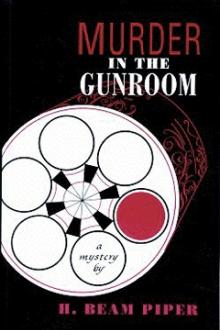Murder in the Gunroom, H. Beam Piper [ebook reader color screen .txt] 📗

- Author: H. Beam Piper
Book online «Murder in the Gunroom, H. Beam Piper [ebook reader color screen .txt] 📗». Author H. Beam Piper
Dunmore, Nelda, Varcek, Geraldine and Gladys had been intending to go to a party that evening, but at the last minute Gladys had pleaded indisposition and telephoned regrets. The meal over, Rand had gone up to the gunroom, Gladys drifted into the small drawing-room off the dining-room, and the others had gone to their rooms to dress.
Rand was taking down the junk with which Walters had infiltrated the collection and was listing and hanging up the recovered items when Fred Dunmore, wearing a dressing-gown, strolled in.
“I can’t get over the idea of Walters being a thief,” he sorrowed. “I wouldn’t have believed it if I hadn’t seen his signed confession. … Well, it just goes to show you. …”
“He took his medicine standing up,” Rand said. “And he helped us recover the pistols. If I were you, I’d go easy with him.”
Dunmore shook his head. “I’m not a revengeful man, Colonel Rand,” he said, “but if there’s one thing I can’t forgive, it’s a disloyal employee.” His mouth closed sternly around his cigar. “He’ll have to take what’s coming to him.” He stood by the desk for a moment, looking down at the recovered items and the pile of junk on the floor. “When did you first suspect him?”
“Almost from the first moment I saw this collection.” Rand explained the reasoning which had led him to suspect Walters. “The real clincher, to my mind, was the fact that he knew this collection almost as well as Lane Fleming did, and wouldn’t be likely to be deceived by these substitutions any more than Fleming would. Yet he said nothing to anybody; neither to Mrs. Fleming, nor Goode, nor myself. If he weren’t guilty himself, I wanted to know his reason for keeping silent. So I put the pressure on him, and he cracked open.”
“Well, I want you to know how grateful we all are,” Dunmore said feelingly. “I’m kicking hell out of myself, now, about the way I objected when Gladys brought you in here. My God, suppose we’d tried to sell the collection ourselves! Anybody who’d have been interested in buying would have seen what you saw, and then they’d have claimed that we were trying to hold out on them.” He hesitated. “You’ve seen how things are here,” he continued ruefully. “And that’s something else I have to thank you for; I mean, keeping your mouth shut till you got the pistols back. There’d have been a hell of a row; everybody would have blamed everybody else. … How did you get him to confess, though?”
Rand told him about the subterfuge of the trumped-up murder charge. Dunmore had evidently never thought of that hoary device; he chuckled appreciatively.
“Say, that was smart! No wonder he was so willing to admit everything and help you get them back.” He looked at the pistols on the desk and moved one or two of them. “Did you get the one the coroner had? Goode said something—”
“Oh, yes; I got that yesterday.” Rand turned and went to the workbench, bringing back the Leech & Rigdon, which he handed to Dunmore. “That’s it. I fired out the other five charges, and cleaned it at the State Police substation.” He watched Dunmore closely, but there seemed to be no reaction.
“So that’s it.” Dunmore looked at it with a show of interest and honest sorrow, and handed it back, then shifted his cigar across his mouth. “Look here, Colonel; I’ve been wanting to ask you something. Did Gladys just get you to come here to appraise and sell the collection, or are you investigating Lane’s death, too?”
“Well, now, you’re asking me to be disloyal to my employer,” Rand objected. “Why don’t you ask her that? If she wants you to know, she’ll tell you.”
“Dammit, I can’t! Suppose she’s satisfied that it really was an accident; would I want to start her worrying and imagining things?”
“No, I suppose you wouldn’t,” Rand conceded. “You’re not at all satisfied on that point yourself, are you?”
“Well, are you?” Dunmore parried.
That sort of fencing could go on indefinitely. Rand determined to stop it. After all, if Dunmore was the murderer of Lane Fleming, he would already know how little Rand was deceived by the fake accident; the Leech & Rigdon had told him that already. If he weren’t, telling him would do no harm at this point, and might even do some good.
“Why, I think Fleming was murdered,” Rand told him, as casually as though he were expressing an opinion on tomorrow’s weather. “And I further believe that whoever killed Fleming also killed Arnold Rivers. That, by the way, is where I come in. Stephen Gresham has retained me to find the Rivers murderer; to do that, I must first learn who killed Lane Fleming. However, I was not retained to investigate the Fleming murder, and as far as I know from anything she has told me, Gladys Fleming is quite satisfied that her husband shot himself accidentally.” In a universe of ordered abstractions and multiordinal meanings, the literal truth, on one order of abstraction, was often a black lie on another. “Does that answer your question?” he asked, with open-faced innocence.
Dunmore nodded. “Yes, I get it, now. Look here, do you think Anton Varcek could have done it? I know it’s a horrible idea, and I want you to understand that I’m not making any accusations, but we always took it for granted that he’d been up in his lab, and had come downstairs when he heard the shot. But





Comments (0)